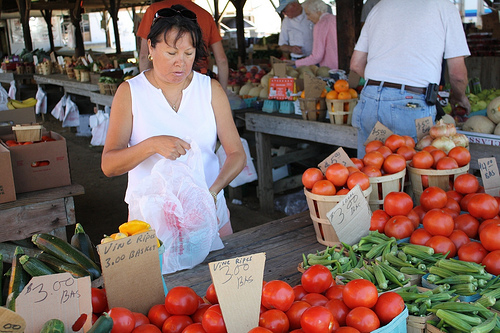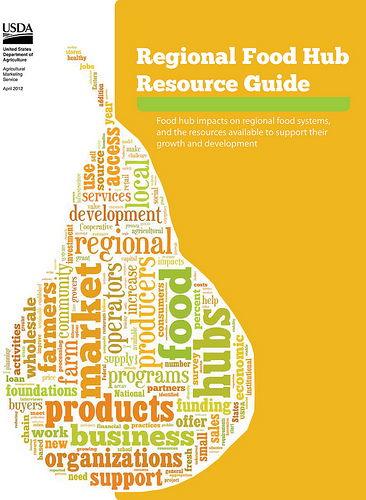
A vendor places tomatoes into a plastic bag for a customer at a Maryland farmers market. Many beginning producers use farmers markets as the gateway to direct marketing opportunities. Photo by Elvert Barnes
This week we’ve celebrated farmers markets as a vibrant segment of U.S. agriculture that offers a unique and personal way to connect producers and consumers. We highlighted decades of farmers market participation, updated the status of farmers markets across the U.S., offered an example of innovation in the lessons learned by a market in Kentucky, and explained how structure and function interact through farmers market architecture. Now, with National Farmers Market Week coming to a close tomorrow, we thought we should share some perspective on how farmers markets fit into the larger local and regional food landscape. Read more »
Understanding a community’s food environment is key to understanding a community’s identity. But what can a “food environment” tell us?
A community’s food environment is a technical term for assessing information about the who, what, where, and how of food availability in a given community: Who are the people in the community?
What kinds of food outlets are available in their area? How accessible are grocery stores and supermarkets? What are some of the health statistics? Read more »

Regional Food Hub Resource Guide. The guide is a collection of information, resources and background on everything needed to develop or participate in a regional food hub.
What can farmers and ranchers do if they’re interested in selling locally but don’t have the resources to run their own trucks, processing plants or marketing strategies? What can institutional buyers, –like schools, hospital and retailers — do to offer more local food to their customers? A regional food hub is one possible answer.
Read more »

The Greensgrow Farms mobile food delivery system. With the help of an FMPP grant, Greensgrow Farms has used this truck to supply residents of the Camden/Philadelphia area with fresh, healthy, affordable foods. (Photo courtesy of Greensgrow Farms)
Every day, thousands of local farmers and ranchers work hard to ensure that their communities have access to a diverse range of fresh, healthy affordable foods. While nutritious food is a cornerstone of society’s physical health, a vibrant community also includes sustainable economic opportunities. By funding projects that support these goals, USDA’s Farmers Market Promotion Program continues to make a difference for farmers at the local level. Read more »

Bi-Rite Market in San Francisco. Wholesale buyers like Bi-Rite see value in marketing local products. Our study found that marketing to regional preferences helps farmers get a better price for their products.
Small and mid-size farmers are the backbone of farmers markets, but they often face particular obstacles when trying to sell products in markets like grocery stores, restaurants, hospitals, and schools. Through the Transportation and Marketing program at USDA’s Agricultural Marketing Service (AMS), we explored this issue in our recent study, Moving Food Along the Value Chain: Innovations in Regional Food Distribution. Read more »

Screenshot of the cover of the Know Your Farmer, Know Your Food Compass.
Are you a farmer, rancher or food business entrepreneur interested in local and regionally-produced food?
Are you a community leader wondering how local and regional food systems can help your local economy?
Are you a consumer interested in learning more about where your food comes from? Read more »





